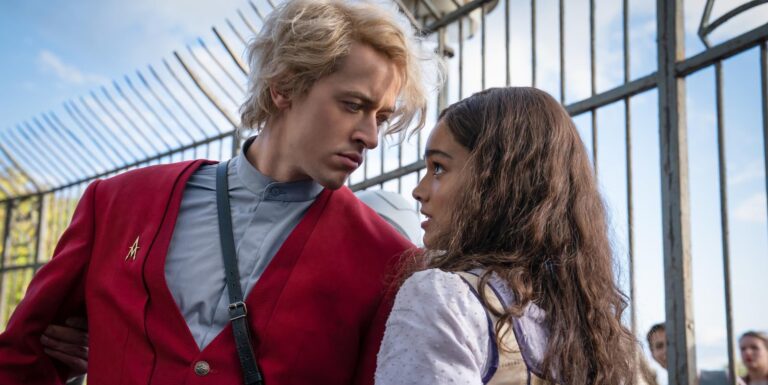If you’ve seen the Hunger Games films and found yourself wondering how Donald Sutherland’s deliciously evil President Snow became such a heartless vision of cold and calculated cruelty, fear not: eight years after the film series concluded with the second installment of Mockingjay, director Francis Lawrence is whisking us back to the world of Panem to answer that question. Set some sixtyish years prior to the adventures of Katniss Everdeen, The Hunger Games: The Ballad of Songbirds and Snakes is both an Easter egg-littered prequel to the YA franchise and a messy, unnecessary origin story for its primary villain.
The 10th annual Hunger Games is fast approaching, but the wealthy elite of the Capitol have lost interests in watching the children of its poorest citizens slaughter each other for their amusement. This can largely be attributed to the fact that the event has not yet evolved into the grand spectacle in which Katniss would eventually partake; the contest is held in a decrepit arena, the participants are unknown, and there’s no reason to care. It’s up to the graduating class of Capitol University to solve this dilemma, and in order to ensure they rise to the task, Dean Highbottom (Peter Dinklage) — creator of the Hunger Games — assigns each student as a mentor to the chosen “tributes” from each district.
Coriolanus Snow (Tom Blyth) suggests a series of radical changes that he believes will stoke public interest; these innovations will seem instantly familiar to fans of the series, right down to the newly anointed host of the event, Lucretius “Lucky” Flickerman (Jason Schwartzman), presumably an ancestor of Stanley Tucci’s character from the trilogy (or quadrilogy, since the third book was split into a pair of films). Coriolanus doesn’t necessarily want the Games to succeed, he’s just vying to secure his family’s future, as the student deemed most effective in their mentorship will be awarded a coveted monetary prize. But his resolve will be tested once he meets his chosen tribute, Lucy Gray Baird (Rachel Zegler), member of a nomadic family of musicians who just happened to be in District 12 during this year’s Reaping ceremony. She belts out a stirring, soulful ballad for the crowd gathered to witness her fate, cementing herself as the most interesting player in the Games, not to mention the film itself.
That Coriolanus quickly begins developing feelings for Lucy Gray hardly comes as a surprise; likewise that he would risk the ire of Dean Highbottom or head gamemaker Volumnia Gaul (Viola Davis at her scenery-devouring best) in order to provide Lucy Gray with an advantage. Every dangerous and agonizing choice he makes feels authentic and true to the character that Blyth develops over the course of the film’s first half, and it’s easy to find ourselves rooting for Coriolanus and Lucy to succeed. But we also know the sort of man Coriolanus will eventually become, which means a happy ending couldn’t possibly be in the cards, and it’s during the latter half of a nearly three-hour running time where The Ballad of Songbirds and Snakes begins to falter. Mockingjay may have been harmed by the studio’s decision to split the narrative across two films, but a similar approach might have actually been the wiser choice for this prequel.
Instead, the pacing rapidly accelerates during the second half, giving scenes little opportunity to breathe before we’re shuttling along to the next development. The result is a series of choices and events that often feel incongruous with the first half, as though an editor realized they were running out of time and decided to trim as much connective tissue as possible to squeeze everything in below the three hour mark. It’s a disservice not only to the storytelling, but also to Blyth and Zegler, whose performances seem cut to pieces and stitched back together, with their chemistry during the final stretch feeling less genuine than in the moments they shared prior to Lucy Gray’s stint in the arena. Furthermore, the future President Snow’s shift toward cruelty feels too sudden, too abrupt to make any logical sense. In that regards, it’s not dissimilar to the ending of the film, arriving seemingly before its time and leaving us to ponder how we managed to get here.

